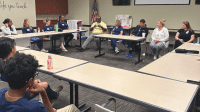If you are involved in a project or program that is truly awesome, why not share it with other nursing units or even neighboring hospitals? Nurses in our busy 18-bed burn/pediatric ICU sought to “share the wealth” by doing just that. We shared ideas and some of our unique projects, along with lessons learned, with our neighboring “rival” hospitals. By doing so, we have promoted goodwill between hospitals in our service area, increased recognition of our successful programs, and elevated the profile of nursing throughout our region. A collegial approach to problem solving and learning from each other sends a positive message to the communities we serve and to nursing students looking for their first jobs. More importantly, it focuses everyone on a common goal: to provide optimal safe care within a healthy and supportive work environment.
Consultation, please
In 2004 two of our ICU nurses presented a successful mentor and education program at an education symposium sponsored by our local chapter of the American Association of Critical-Care Nurses. The response was incredible and started us on our sharing path.
Our ICU nurses shared this program with several area hospitals and helped other units set up mentoring programs. Our own organizational training and development department asked us to tailor a mentor-training program to be offered hospital-wide within our facility.
That was just the beginning of our sharing experiences. Since then, unit staff presentations at national conferences on several other topics have resulted in many e-mail, phone, and in-person consultations. We have shared information regarding pre-transfer burn care, management of pediatric trauma, injury prevention programs, and orientation secrets. Our unit has showcased a successful Self-Scheduling Program, a popular “ICU to Acute Care Checklist,” and an active unit-based Best Practice Committee. Nurses from our unit have been asked to teach advanced burn care, pulmonary artery catheter management, and pediatric topics at many training venues. These are just a few of the things that we have been honored to share with others.
A two-way street
Our hospital administration supports our efforts to be ambassadors of our organization. Most of our sharing has been about the process of development, and we have steered away from sharing a completed program to avoid intellectual property issues. We have found it quite rewarding to assist other workgroups to develop programs that are uniquely theirs, while benefiting from some of our mistakes and discoveries.
This sharing is a two-way street; more than once we have spent the day in another hospital only to come back with ideas such as staff recognition, new employee welcoming, and streamlining group report.
Additional benefits
Burn/pediatric ICU nurses have been honored to share their successes with peers from neighboring hospitals as well as with other units in our own facility. It is encouraging to see the interest in our programs by others, and to be welcomed into rival hospitals as goodwill ambassadors. Several of our recent hires have made the choice to join our staff after hearing of some of our innovative and exciting projects. Nurses cite the level of recognition and the pioneering spirit of our unit as a major retention factor. Sharing “secrets” has been quite positive for many nurses from the burn/pediatric ICU.
At the time this article was written, Raymond Johanson was assistant nurse manager, Burn Surgery & Pediatric Trauma ICU, at Harborview Medical Center/ UW Medicine, Seattle, Washington. He is now the ICU Clinical Coordinator at Northwest Hospital & Medical Center/UW Medicine, Seattle, Washington.
From our readers gives nurses the opportunity to share experiences that would be helpful to their nurse colleagues. Because of this format, the stories have been minimally edited. If you would like to submit an article for From our readers, click here.

















